
cohort_structure
This repository contains detailed information about the structure of AI Saturdays Lagos Cohort.
Stars: 75
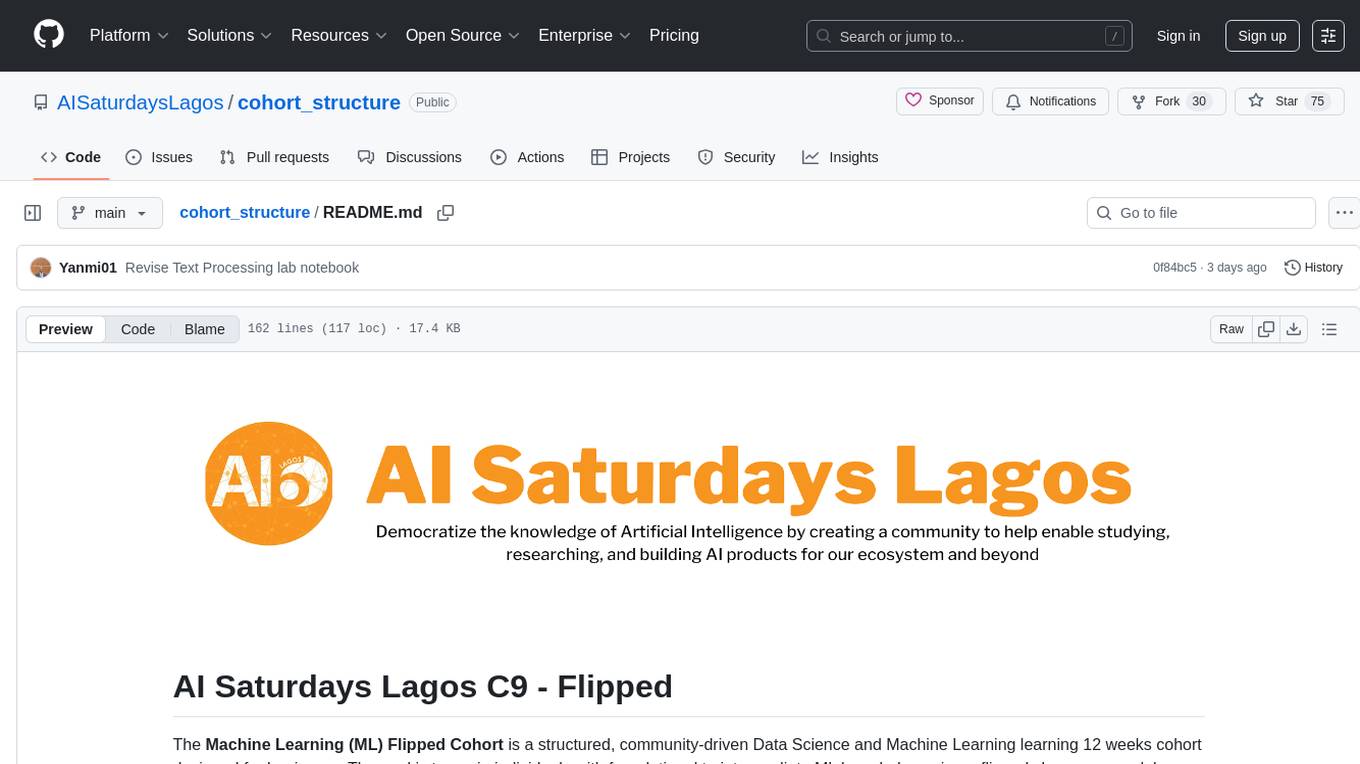
The Machine Learning (ML) Flipped Cohort is a 12-week structured program designed for beginners to gain foundational to intermediate ML knowledge. Participants consume pre-recorded content during the week and engage in weekly community discussions. The program covers topics such as Python, data science foundations, databases, math for ML, text processing, linear regression, non-linear modeling, deep learning basics, and more. Participants work on capstone projects and are assessed through Google Forms. Certification requires minimum attendance, assessment scores, and participation in the final project. The cohort provides a supportive learning environment with mentorship and community interaction.
README:
The Machine Learning (ML) Flipped Cohort is a structured, community-driven Data Science and Machine Learning learning 12 weeks cohort designed for beginners. The goal is to equip individuals with foundational to intermediate ML knowledge using a flipped classroom model where learners independently consume pre-recorded content during the week, then attend a weekly community to discuss, explore and ask questions about what they’ve learned.
We follow a flipped classroom model where:
- Participants watch curated pre-recorded lectures and complete labs during the week.
- Every Saturday, attend a community call to engage with one of the organizers.
Each week you will be:
- Assigned selected videos (from a curated playlist of lectures and labs)
- Receive supporting materials like Jupyter notebooks, slides, and assessments
- Join a live Zoom session on weekends to engage with instructors and peers
- Interact daily on Discord for Q&A, collaboration, and accountability
By the end of the cohort, you will:
- Participate in capstone projects and present your solution to demonstrate real-world understanding
- Earn a certificate if all conditions are met (see below)
This cohort is ideal for:
- Students and recent graduates exploring data science or ML
- Career switchers with programming experience aiming to enter ML roles
- Self-learners seeking structure, mentorship, and a community
- You!
Prerequisite: Basic Python knowledge is expected
We’ll provide beginner-friendly Python resources during Week 1 for anyone needing a refresher.
The cohort will run for 10–12 weeks, broken down into:
- 10 weeks of structured learning
- Capstone projects
Important Dates
- Cohort Start Date: July 26, 2025
- Cohort End Date: October 18, 2025
| Tool | Purpose | Link |
|---|---|---|
| GitHub | All materials, assignments, and resources | Cohort Repository |
| Gmail Group | Announcements & Notifications | AI6 Lagos Group |
| Zoom | Weekly community sessions & project demos | Link shared weekly |
| Discord | Daily interaction, Q&A, accountability & support | Join Discord |
| YouTube | Pre-recorded lectures & community session recordings | Pre-recorded Lectures & Lab, C9 - Weekly Community Sessions |
Each week will follow this schedule:
- Sundays: Email regarding the videos, labs, notebooks and slides for the week will be sent to participants
- Saturdays: Complete and Submit Assessments 9:00 AM WAT on Saturdays
- Saturdays: Attend a 2-hour community discussion via Zoom (10-12 PM WAT)
There will be an onboarding session on July 26th, at 10:00 AM WAT.
| Week | Dates | Topics | Lectures | Labs | Assessment | Suggested Weekly Schedule |
|---|---|---|---|---|---|---|
| 0 | Jul 26 | Onboarding & Kickoff | - | - | - | - |
| 1 | Jul 27 – Aug 2 | Python & Numerical Computing | ☘️Python Refresher: Lecture Video , Lecture Notebook ☘️Numerical Computing with Python and Numpy: Lecture Video, Lecture Notebook |
- | Link |
Mon: Python Refresher Lecture Wed: NumPy Lecture |
| 2 | Aug 3 – Aug 9 | Data Science Foundations | ☘️Introduction to Data Science: Lecture Video, Lecture Slides ☘️Data Collection and Scraping: Lecture Video, Lecture Slides |
🍒Introduction to Git and Github: Lab Video, Lab Slides 🍒Data Collection and Scraping: Lab Video, Lab Notebook |
link |
Mon: Intro to DS Lecture Tue: Intro + Git/GitHub Lab Wed: Data Collection Lecture Thur: Data Collection Lab |
| 3 | Aug 10 – Aug 16 | Databases, SQL & Exploratory Data Analysis | ☘️Relational Data: Lecture Video, Lecture Slides ☘️ Visualization and Data Exploration: Lecture Video, Lecture Slides |
🍒Relational Data and SQL: Lab Video, Lab Notebook 🍒Data Exploration and Visualization: Lab Video, Lab Notebook |
Link |
Mon: Relational data Lecture Tue: Relational data Lab Wed: Data Exploration Lecture Thur: Data Exploration Lab |
| 4 | Aug 17 – Aug 23 | Math for ML | ☘️Linear Algebra: Lecture Video, Lecture Notebook, Lecture Slides | - | TBD |
Mon: Linear Algebra Lecture Wed: Linear Algebra Notebook |
| 5 | Aug 24 – Aug 30 | Text Processing | ☘️ Free Text and Natural Language Processing: Lecture Video, Lecture Slides | 🍒Text Processing: Lab Video, Lab Notebook |
Mon: Free Text & NLP Lecture Wed: Text Processing Lab |
|
| Project Checkpoint | ||||||
| 6 | Aug 31 – Sep 6 | Linear Regression & Classification Models | ☘️Introduction to Machine Learning & Linear Regression: Lecture Video, Lecture Slides ☘️Linear Classification: Lecture Video, Lecture Slides |
🍒Linear Regression and Classification: Lab Video, Lab Notebook | TBD |
Mon: Introduction to ML Lecture Wed: Linear Classification Lecture Thur Linear Regression & Classification Lab |
| 7 | Sep 7 – Sep 13 | Non-Linear Modeling & Interpretable ML | ☘️Nonlinear Modeling, Cross-Validation: Lecture Video, Lecture Slides ☘️Decision Trees, Interpretable Models: Lecture Video, Lecture Slides |
🍒Nonlinear Modeling: Lab Video, Lab Notebook | TBD |
Mon: Nonlinear Modeling Lecture Tue: Nonlinear Modeling Lab Wed: Decision Trees Lecture |
| 8 | Sep 14 – Sep 20 | Probabilistic Models | ☘️Basics of Probability: Lecture Video, Lecture Slides ☘️Maximum Likelihood Estimation, Naive bayes: Lecture Video, Lecture Slides |
- | TBD |
Mon: Basics of Probability Lecture Wed: MLE, Naive Bayes Lecture |
| 9 | Sep 21 – Sep 27 | Unsupervised Learning & Recommendation Systems | ☘️Unsupervised Learning: Lecture Video, Lecture Slides ☘️Recommendation Systems: Lecture Video, Lecture Slides |
🍒Unsupervised Learning: Lab Video, Lab Notebook 🍒Recommendation Systems: Lab Notebook |
TBD |
Mon: Unsupervised Learning Lecture Tue: Unsupervised Learning Lab Wed: Recommendation Systems Lecture Thur: Recommendation Systems Lab |
| 10 | Sep 28 – Oct 4 | Deep Learning Basics | ☘️Introduction to Deep Learning: Lecture Video, Lecture Slides | 🍒Neural Networks: Lab Video, Lab Notebook | TBD |
Mon: Deep Learning Lecture Wed: Neural Network Lab |
| Capstone Project Submission | ||||||
| 12 | Oct 18 | Project Presentations | - | - | - | - |
- Submitted via Google Forms
- Deadline: 1 hour before the community call on Saturdays
- Reviewed live during the discussion
TBD
To receive a Certificate of Completion:
- 60% minimum attendance at community calls (tracked via Google Forms)
- 40% average assessment score
- 100% participation in the final project (submission required)
TBD
You are encouraged to explore the following:
- ML Zoomcamp – DataTalksClub
- CMU Data Science Course
- Stanford ML Course – Andrew Ng
- Machine Learning @ VU Amsterdam
This cohort is built on the foundation laid by the incredible work from Cohort 8 (C8) — its lectures, labs, and community contributions. We are deeply grateful to the selfless volunteers who made it all possible: class instructors, lab facilitators, mentors, and countless others who gave their time and expertise.
Our community is fortunate to be supported by such a generous, talented, and inspiring group of individuals. Thank you for your continued impact.
- Afolabi Animashaun
- Akintayo Jabar
- Allen Akinkunle
- Aseda Addai-Deseh
- Deborah Kanubala
- Ejiro Onose
- Emefa Duah
- Femi Ogunbode
- Fortune Adekogbe
- Foutse Yuehgoh
- Funmito Adeyemi
- Joscha Cüppers
- Khadija Iddrisu
- Kenechi Dukor
- Lawrence Francis
- Olumide Okubadejo
- Oluwaseun Ajayi
- Oluwatoyin Yetunde Sanni
- Sandra Oriji
- Steven Kolawole
- Tejumade Afonja
- Wuraola Oyewusi
This effort is brought to you by our amazing team of volunteers — thank you for your time, dedication, and leadership.
- Adetola Adetunji
- Ibrahim Gana
- Jesuyanmife Egbewale (cohort lead)
- Kenechi Dukor
- Oluwafemi Azeez
- Sharon Alawode
- Simon Ubi
- Tejumade Afonja
For Tasks:
Click tags to check more tools for each tasksFor Jobs:
Alternative AI tools for cohort_structure
Similar Open Source Tools

cohort_structure
The Machine Learning (ML) Flipped Cohort is a 12-week structured program designed for beginners to gain foundational to intermediate ML knowledge. Participants consume pre-recorded content during the week and engage in weekly community discussions. The program covers topics such as Python, data science foundations, databases, math for ML, text processing, linear regression, non-linear modeling, deep learning basics, and more. Participants work on capstone projects and are assessed through Google Forms. Certification requires minimum attendance, assessment scores, and participation in the final project. The cohort provides a supportive learning environment with mentorship and community interaction.
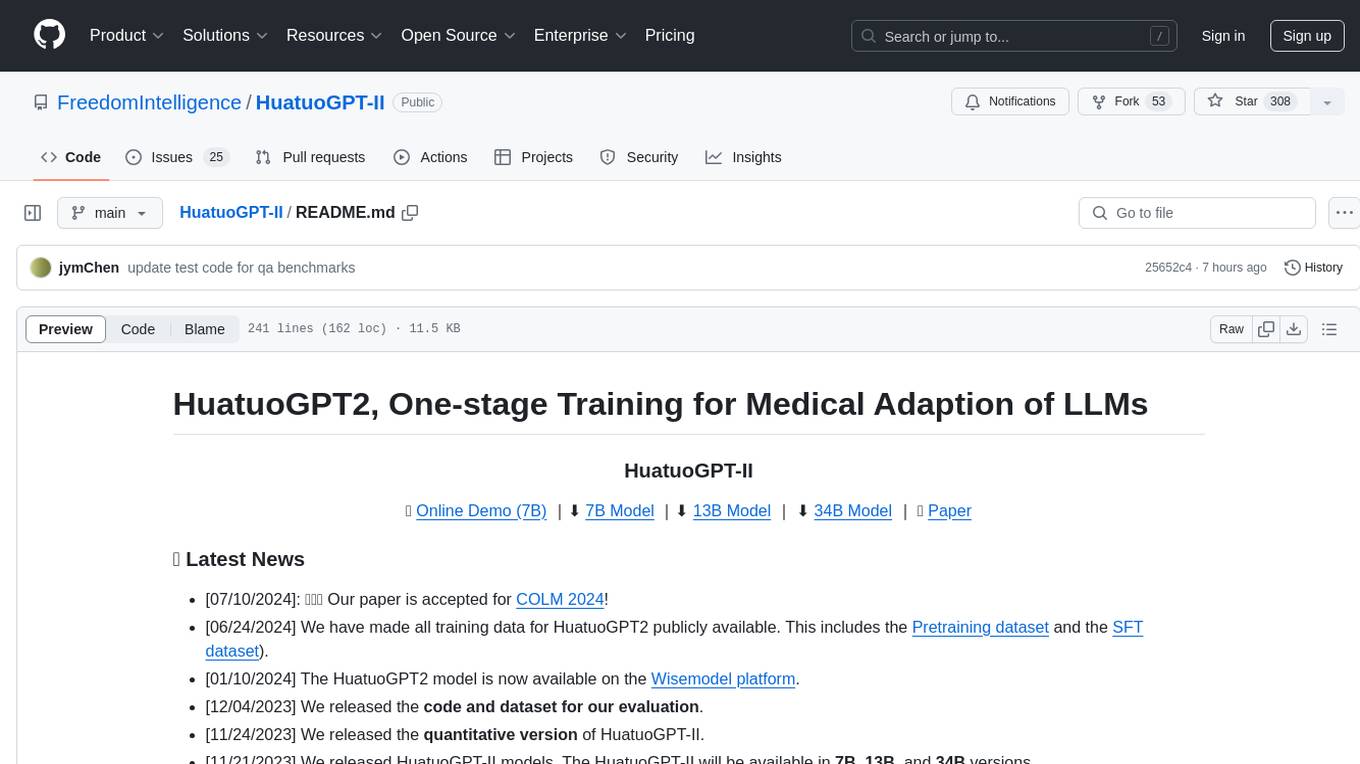
HuatuoGPT-II
HuatuoGPT2 is an innovative domain-adapted medical large language model that excels in medical knowledge and dialogue proficiency. It showcases state-of-the-art performance in various medical benchmarks, surpassing GPT-4 in expert evaluations and fresh medical licensing exams. The open-source release includes HuatuoGPT2 models in 7B, 13B, and 34B versions, training code for one-stage adaptation, partial pre-training and fine-tuning instructions, and evaluation methods for medical response capabilities and professional pharmacist exams. The tool aims to enhance LLM capabilities in the Chinese medical field through open-source principles.
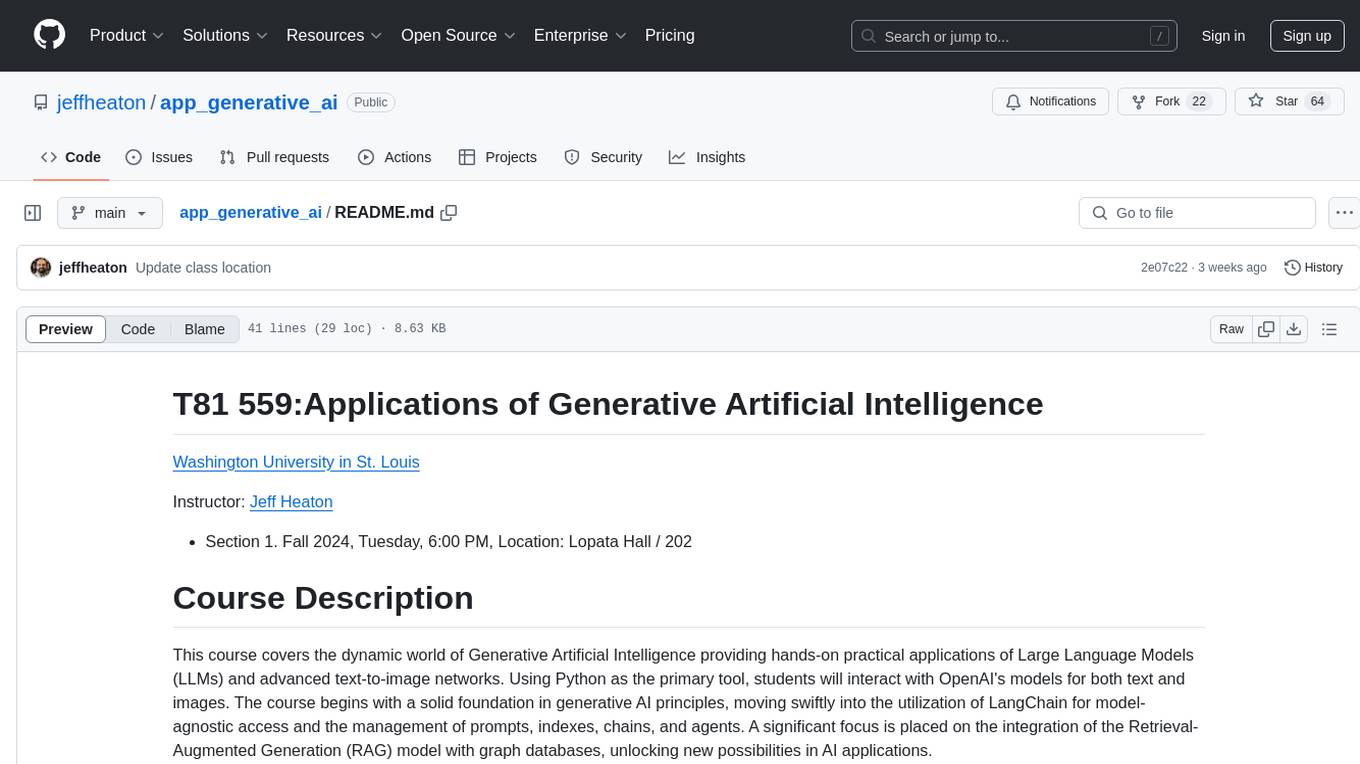
app_generative_ai
This repository contains course materials for T81 559: Applications of Generative Artificial Intelligence at Washington University in St. Louis. The course covers practical applications of Large Language Models (LLMs) and text-to-image networks using Python. Students learn about generative AI principles, LangChain, Retrieval-Augmented Generation (RAG) model, image generation techniques, fine-tuning neural networks, and prompt engineering. Ideal for students, researchers, and professionals in computer science, the course offers a transformative learning experience in the realm of Generative AI.
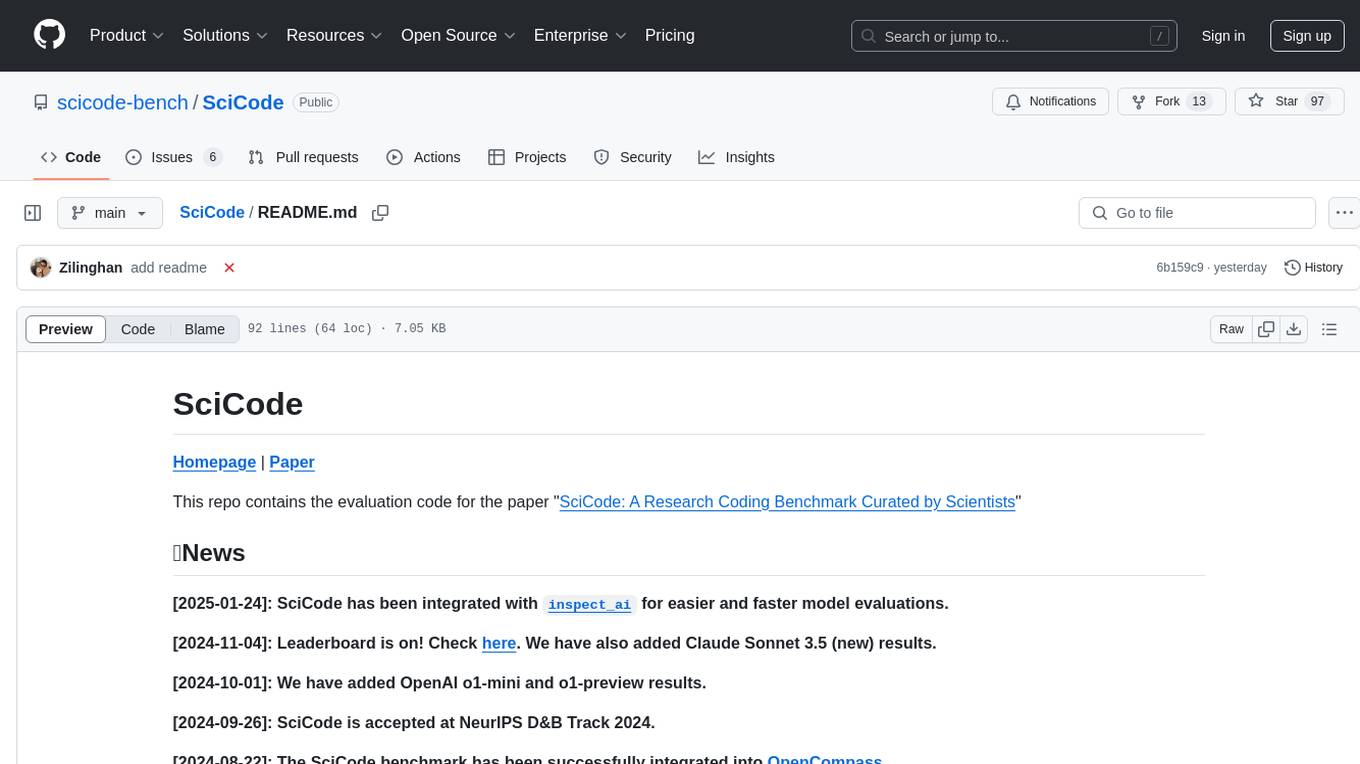
SciCode
SciCode is a challenging benchmark designed to evaluate the capabilities of language models (LMs) in generating code for solving realistic scientific research problems. It contains 338 subproblems decomposed from 80 challenging main problems across 16 subdomains from 6 domains. The benchmark offers optional descriptions specifying useful scientific background information and scientist-annotated gold-standard solutions and test cases for evaluation. SciCode demonstrates a realistic workflow of identifying critical science concepts and facts and transforming them into computation and simulation code, aiming to help showcase LLMs' progress towards assisting scientists and contribute to the future building and evaluation of scientific AI.
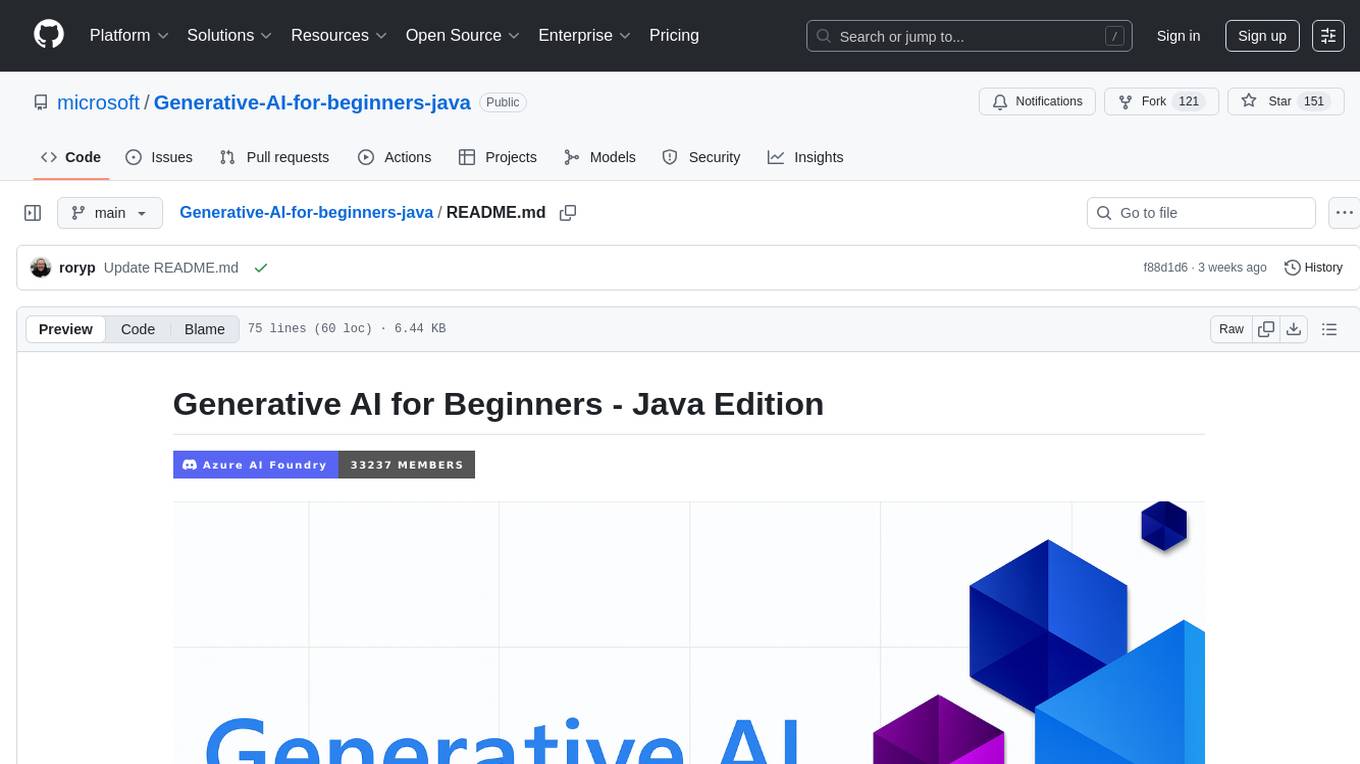
Generative-AI-for-beginners-java
Generative AI for Beginners - Java Edition is a comprehensive workshop that introduces users to the core concepts of generative AI, Java AI ecosystem, model context protocol, and practical applications. The course covers topics such as prompt engineering, embeddings & vector operations, retrieval-augmented generation, and responsible AI development. Users can explore real-world scenarios like chatbots, content generation, and ethical AI development. The workshop provides a hands-on learning experience with multi-language support and development environment setup guidance.
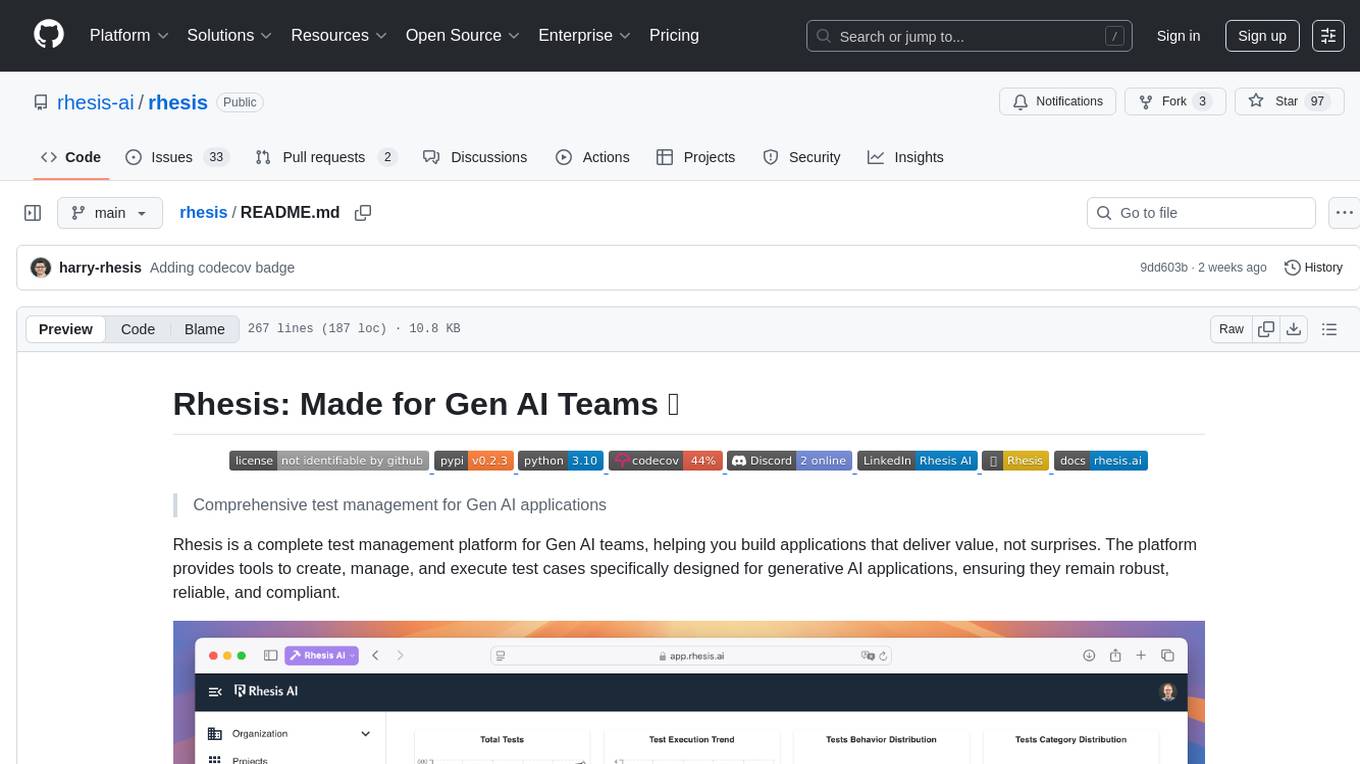
rhesis
Rhesis is a comprehensive test management platform designed for Gen AI teams, offering tools to create, manage, and execute test cases for generative AI applications. It ensures the robustness, reliability, and compliance of AI systems through features like test set management, automated test generation, edge case discovery, compliance validation, integration capabilities, and performance tracking. The platform is open source, emphasizing community-driven development, transparency, extensible architecture, and democratizing AI safety. It includes components such as backend services, frontend applications, SDK for developers, worker services, chatbot applications, and Polyphemus for uncensored LLM service. Rhesis enables users to address challenges unique to testing generative AI applications, such as non-deterministic outputs, hallucinations, edge cases, ethical concerns, and compliance requirements.
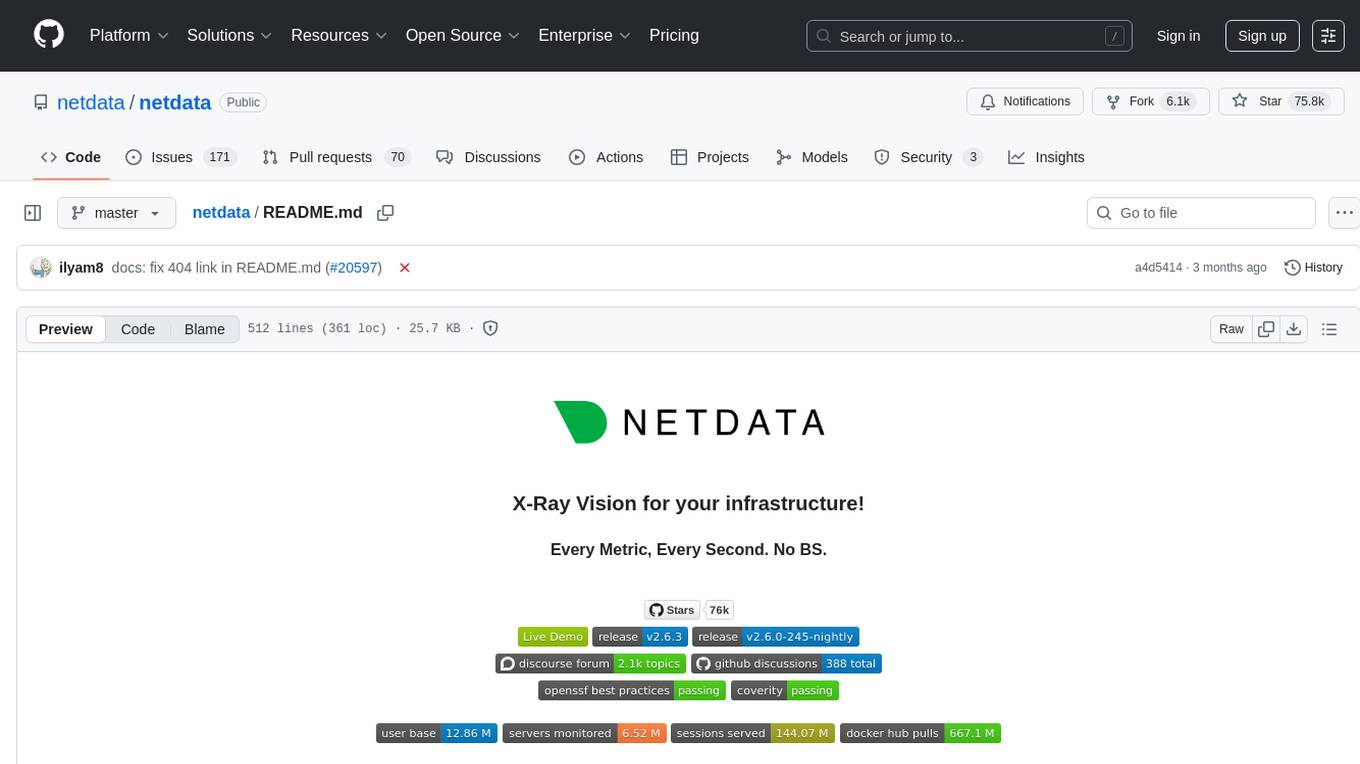
netdata
Netdata is an open-source, real-time infrastructure monitoring platform that provides instant insights, zero configuration deployment, ML-powered anomaly detection, efficient monitoring with minimal resource usage, and secure & distributed data storage. It offers real-time, per-second updates and clear insights at a glance. Netdata's origin story involves addressing the limitations of existing monitoring tools and led to a fundamental shift in infrastructure monitoring. It is recognized as the most energy-efficient tool for monitoring Docker-based systems according to a study by the University of Amsterdam.

motia
Motia is an AI agent framework designed for software engineers to create, test, and deploy production-ready AI agents quickly. It provides a code-first approach, allowing developers to write agent logic in familiar languages and visualize execution in real-time. With Motia, developers can focus on business logic rather than infrastructure, offering zero infrastructure headaches, multi-language support, composable steps, built-in observability, instant APIs, and full control over AI logic. Ideal for building sophisticated agents and intelligent automations, Motia's event-driven architecture and modular steps enable the creation of GenAI-powered workflows, decision-making systems, and data processing pipelines.
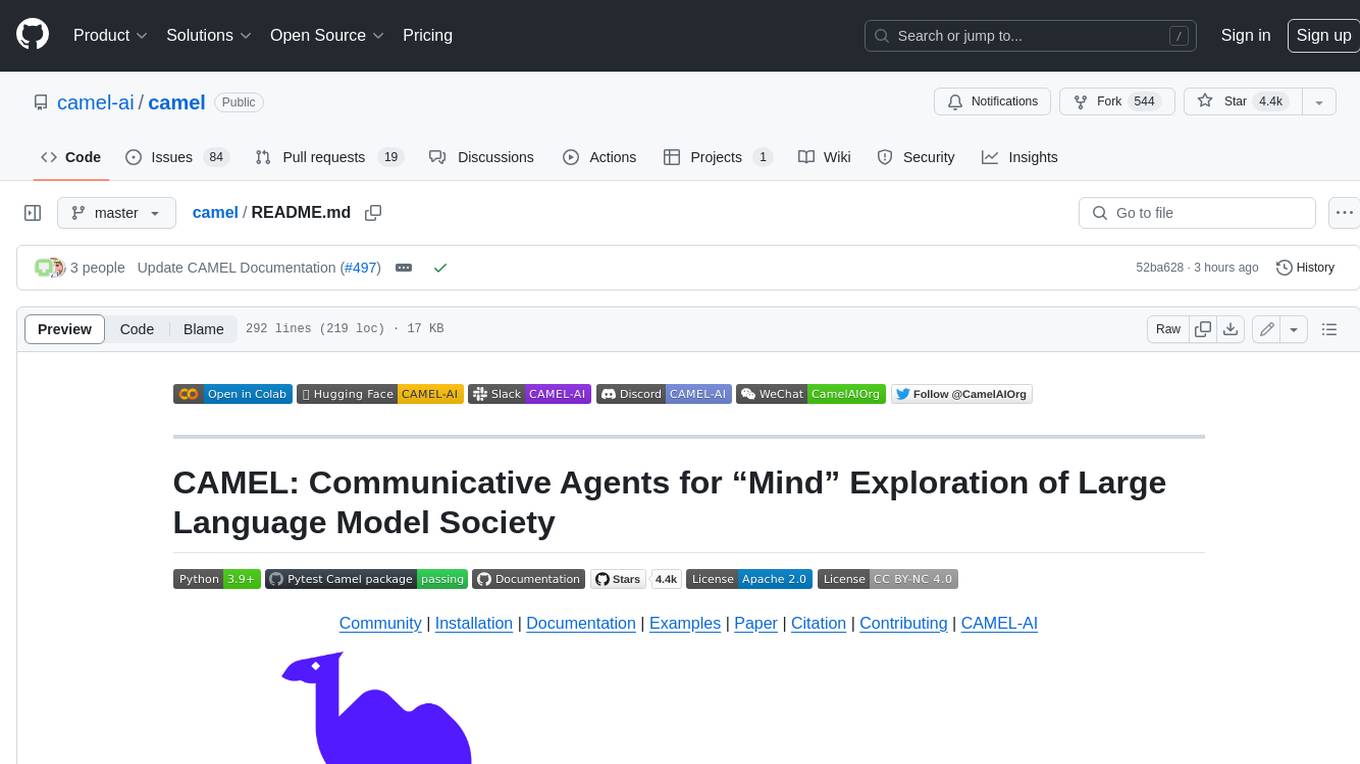
camel
CAMEL is an open-source library designed for the study of autonomous and communicative agents. We believe that studying these agents on a large scale offers valuable insights into their behaviors, capabilities, and potential risks. To facilitate research in this field, we implement and support various types of agents, tasks, prompts, models, and simulated environments.
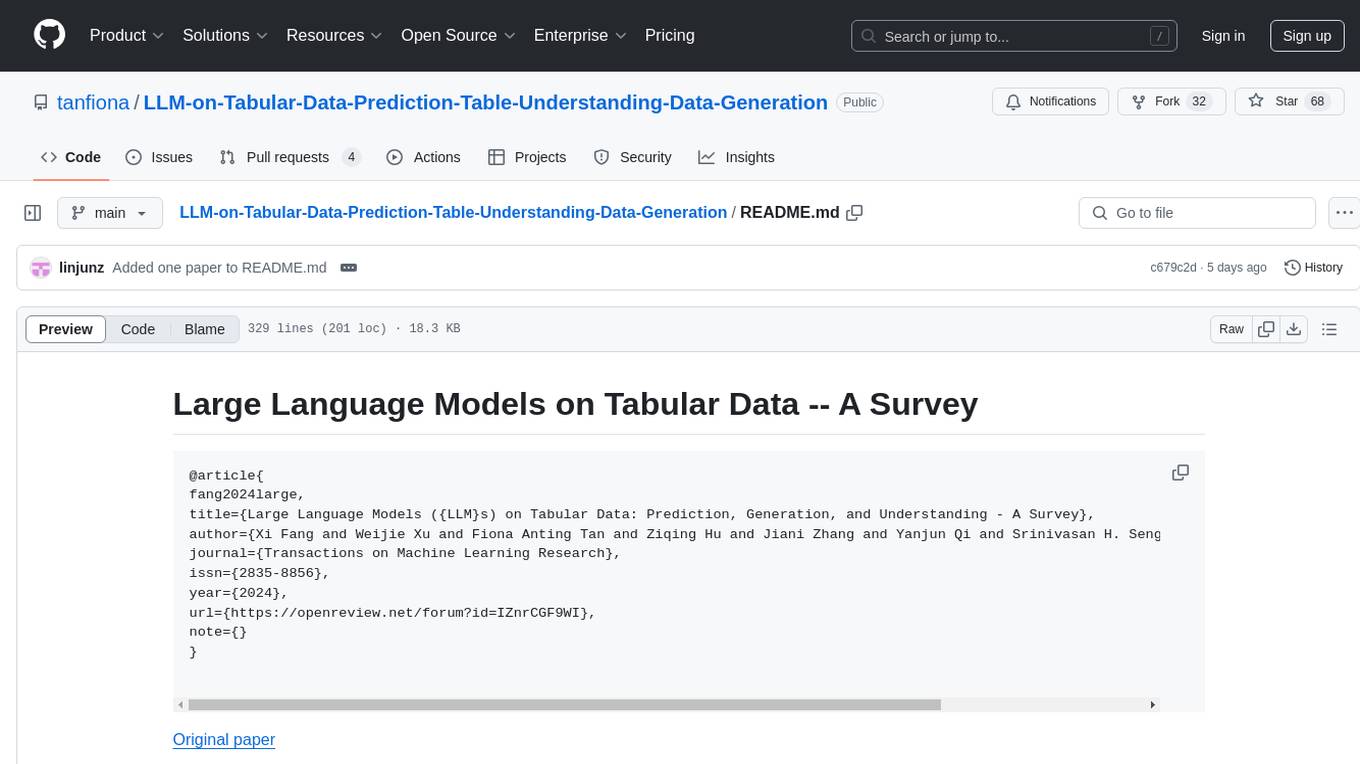
LLM-on-Tabular-Data-Prediction-Table-Understanding-Data-Generation
This repository serves as a comprehensive survey on the application of Large Language Models (LLMs) on tabular data, focusing on tasks such as prediction, data generation, and table understanding. It aims to consolidate recent progress in this field by summarizing key techniques, metrics, datasets, models, and optimization approaches. The survey identifies strengths, limitations, unexplored territories, and gaps in the existing literature, providing insights for future research directions. It also offers code and dataset references to empower readers with the necessary tools and knowledge to address challenges in this rapidly evolving domain.
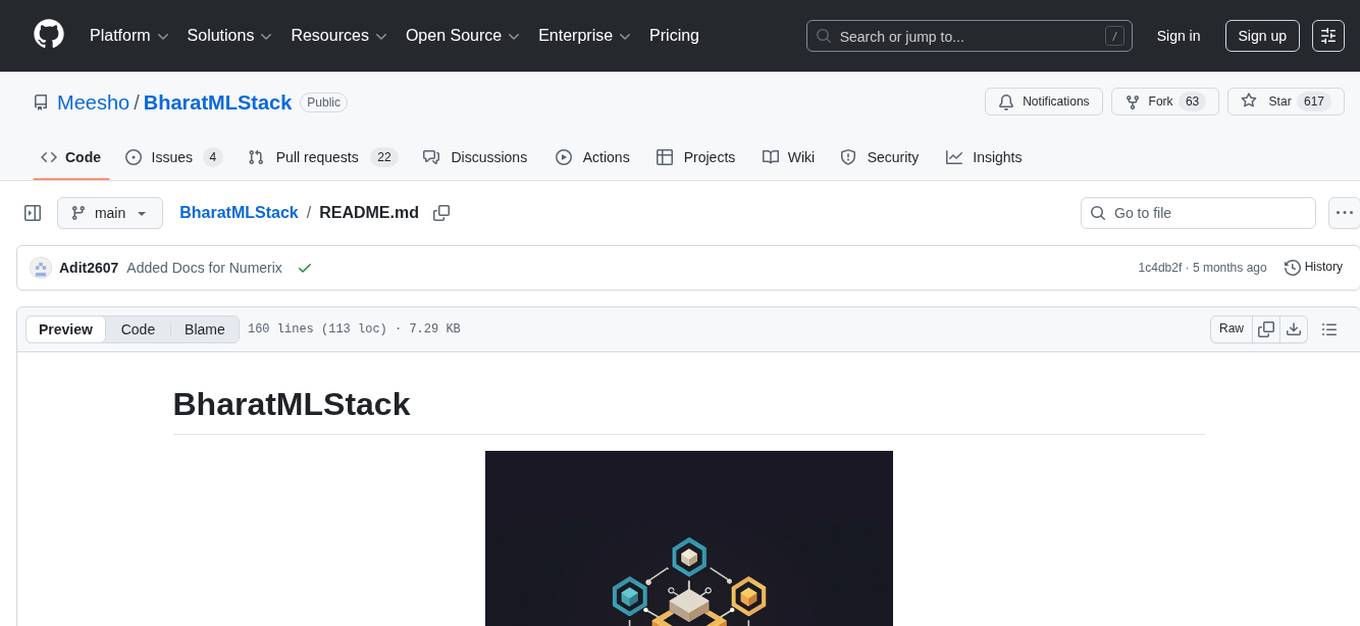
BharatMLStack
BharatMLStack is a comprehensive, production-ready machine learning infrastructure platform designed to democratize ML capabilities across India and beyond. It provides a robust, scalable, and accessible ML stack empowering organizations to build, deploy, and manage machine learning solutions at massive scale. It includes core components like Horizon, Trufflebox UI, Online Feature Store, Go SDK, Python SDK, and Numerix, offering features such as control plane, ML management console, real-time features, mathematical compute engine, and more. The platform is production-ready, cloud agnostic, and offers observability through built-in monitoring and logging.
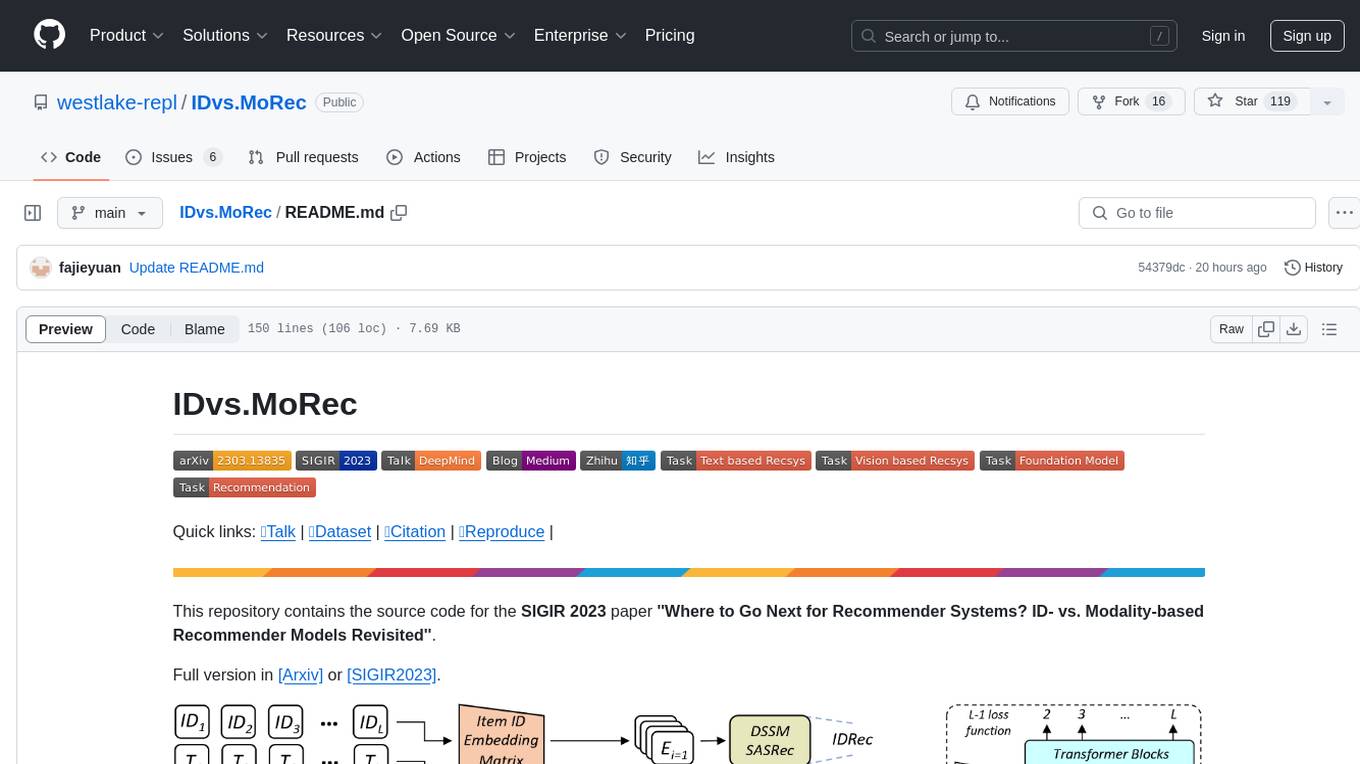
IDvs.MoRec
This repository contains the source code for the SIGIR 2023 paper 'Where to Go Next for Recommender Systems? ID- vs. Modality-based Recommender Models Revisited'. It provides resources for evaluating foundation, transferable, multi-modal, and LLM recommendation models, along with datasets, pre-trained models, and training strategies for IDRec and MoRec using in-batch debiased cross-entropy loss. The repository also offers large-scale datasets, code for SASRec with in-batch debias cross-entropy loss, and information on joining the lab for research opportunities.
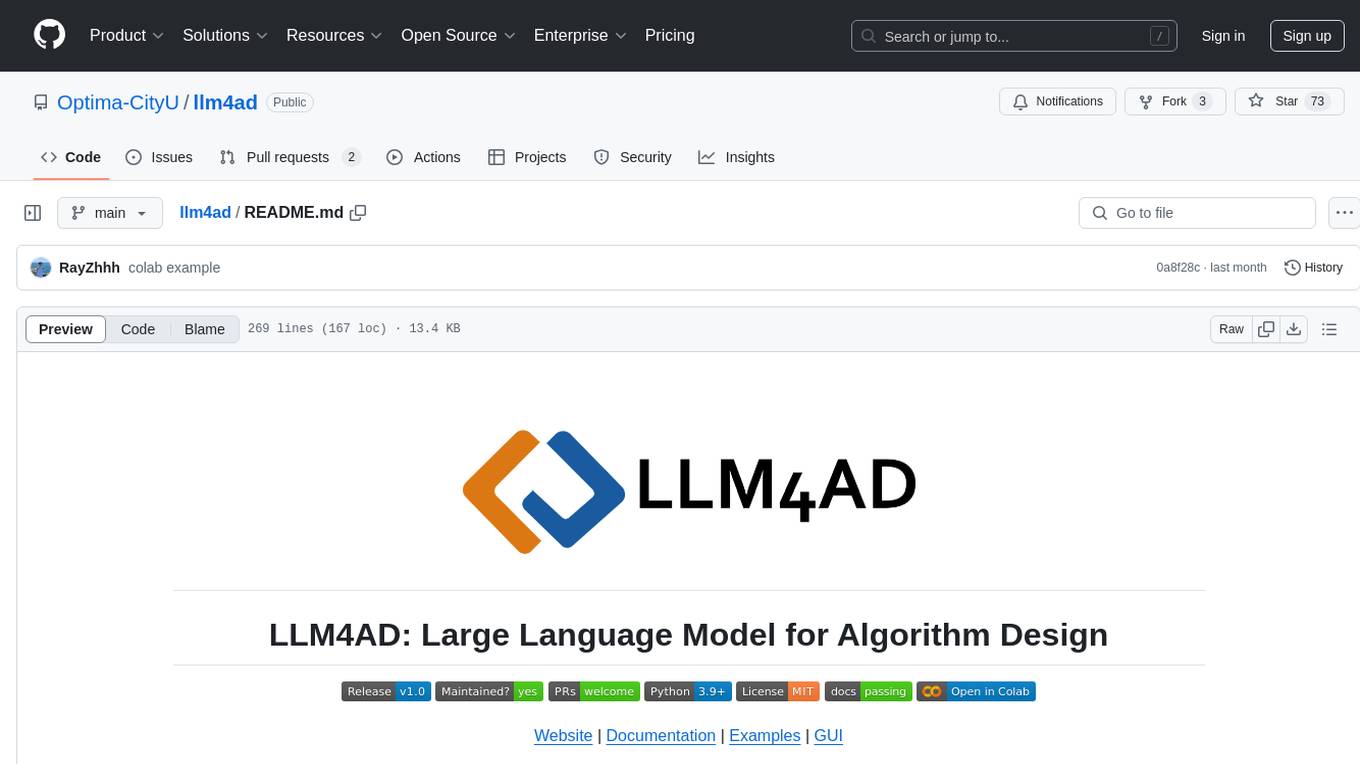
llm4ad
LLM4AD is an open-source Python-based platform leveraging Large Language Models (LLMs) for Automatic Algorithm Design (AD). It provides unified interfaces for methods, tasks, and LLMs, along with features like evaluation acceleration, secure evaluation, logs, GUI support, and more. The platform was originally developed for optimization tasks but is versatile enough to be used in other areas such as machine learning, science discovery, game theory, and engineering design. It offers various search methods and algorithm design tasks across different domains. LLM4AD supports remote LLM API, local HuggingFace LLM deployment, and custom LLM interfaces. The project is licensed under the MIT License and welcomes contributions, collaborations, and issue reports.
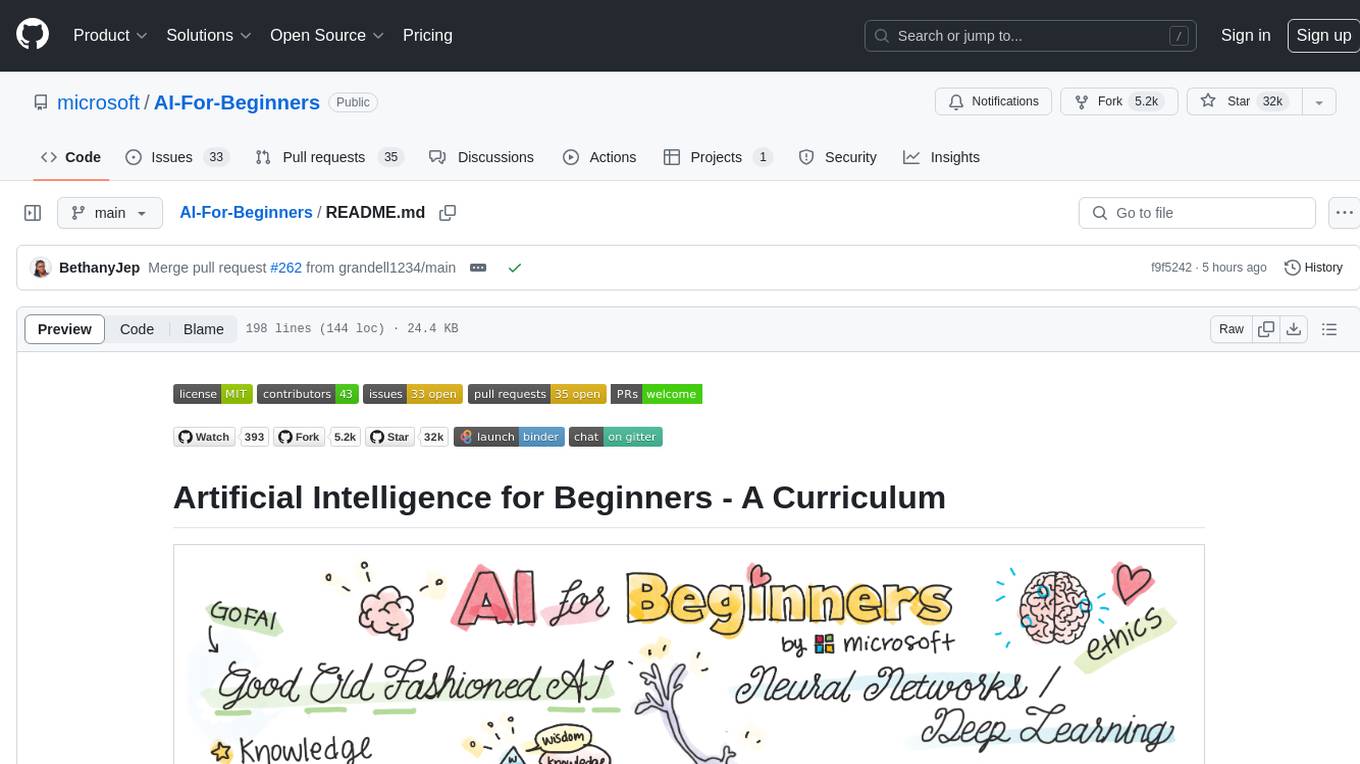
AI-For-Beginners
AI-For-Beginners is a comprehensive 12-week, 24-lesson curriculum designed by experts at Microsoft to introduce beginners to the world of Artificial Intelligence (AI). The curriculum covers various topics such as Symbolic AI, Neural Networks, Computer Vision, Natural Language Processing, Genetic Algorithms, and Multi-Agent Systems. It includes hands-on lessons, quizzes, and labs using popular frameworks like TensorFlow and PyTorch. The focus is on providing a foundational understanding of AI concepts and principles, making it an ideal starting point for individuals interested in AI.
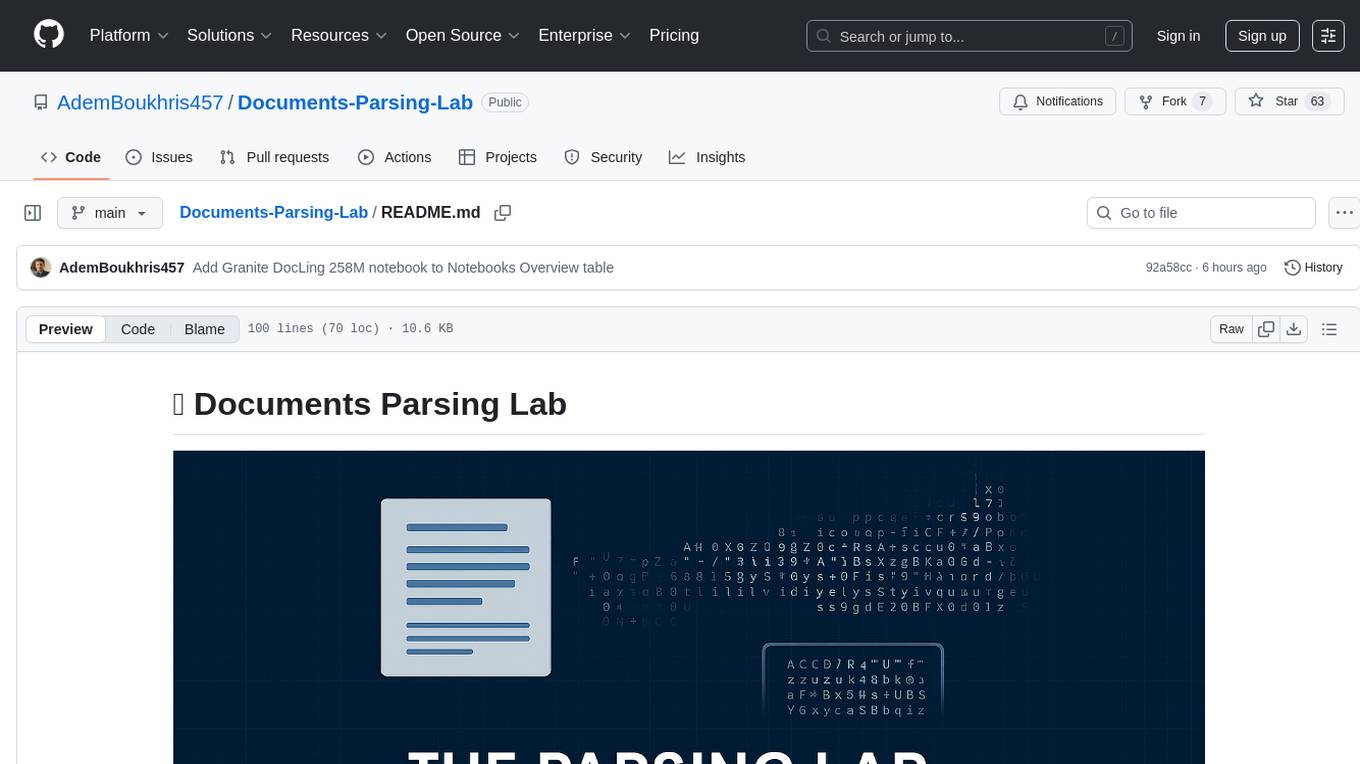
Documents-Parsing-Lab
A curated collection of Jupyter notebooks for experimenting with state-of-the-art OCR, document parsing, table extraction, and chart understanding techniques. This repository enables easy benchmarking and practical usage of the latest open-source and cloud-based solutions for document image processing.
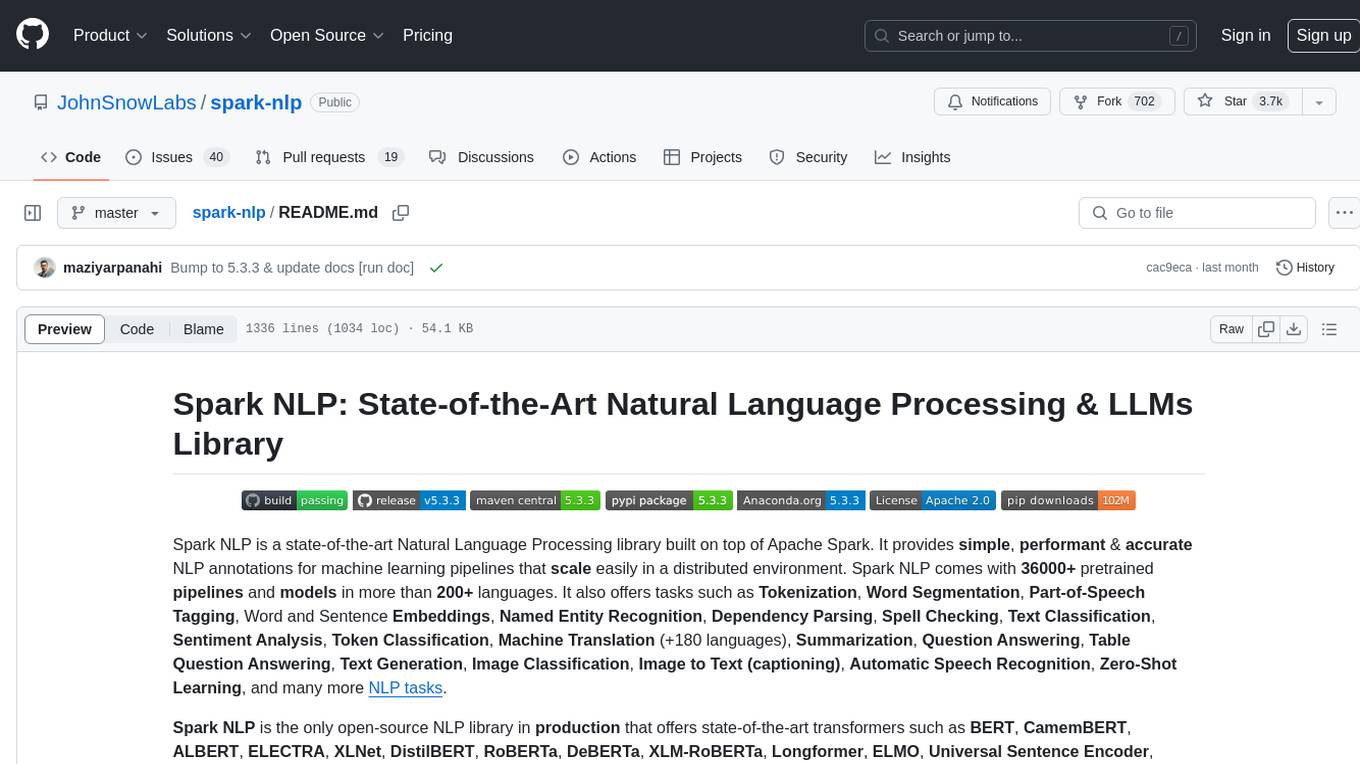
spark-nlp
Spark NLP is a state-of-the-art Natural Language Processing library built on top of Apache Spark. It provides simple, performant, and accurate NLP annotations for machine learning pipelines that scale easily in a distributed environment. Spark NLP comes with 36000+ pretrained pipelines and models in more than 200+ languages. It offers tasks such as Tokenization, Word Segmentation, Part-of-Speech Tagging, Named Entity Recognition, Dependency Parsing, Spell Checking, Text Classification, Sentiment Analysis, Token Classification, Machine Translation, Summarization, Question Answering, Table Question Answering, Text Generation, Image Classification, Image to Text (captioning), Automatic Speech Recognition, Zero-Shot Learning, and many more NLP tasks. Spark NLP is the only open-source NLP library in production that offers state-of-the-art transformers such as BERT, CamemBERT, ALBERT, ELECTRA, XLNet, DistilBERT, RoBERTa, DeBERTa, XLM-RoBERTa, Longformer, ELMO, Universal Sentence Encoder, Llama-2, M2M100, BART, Instructor, E5, Google T5, MarianMT, OpenAI GPT2, Vision Transformers (ViT), OpenAI Whisper, and many more not only to Python and R, but also to JVM ecosystem (Java, Scala, and Kotlin) at scale by extending Apache Spark natively.
For similar tasks
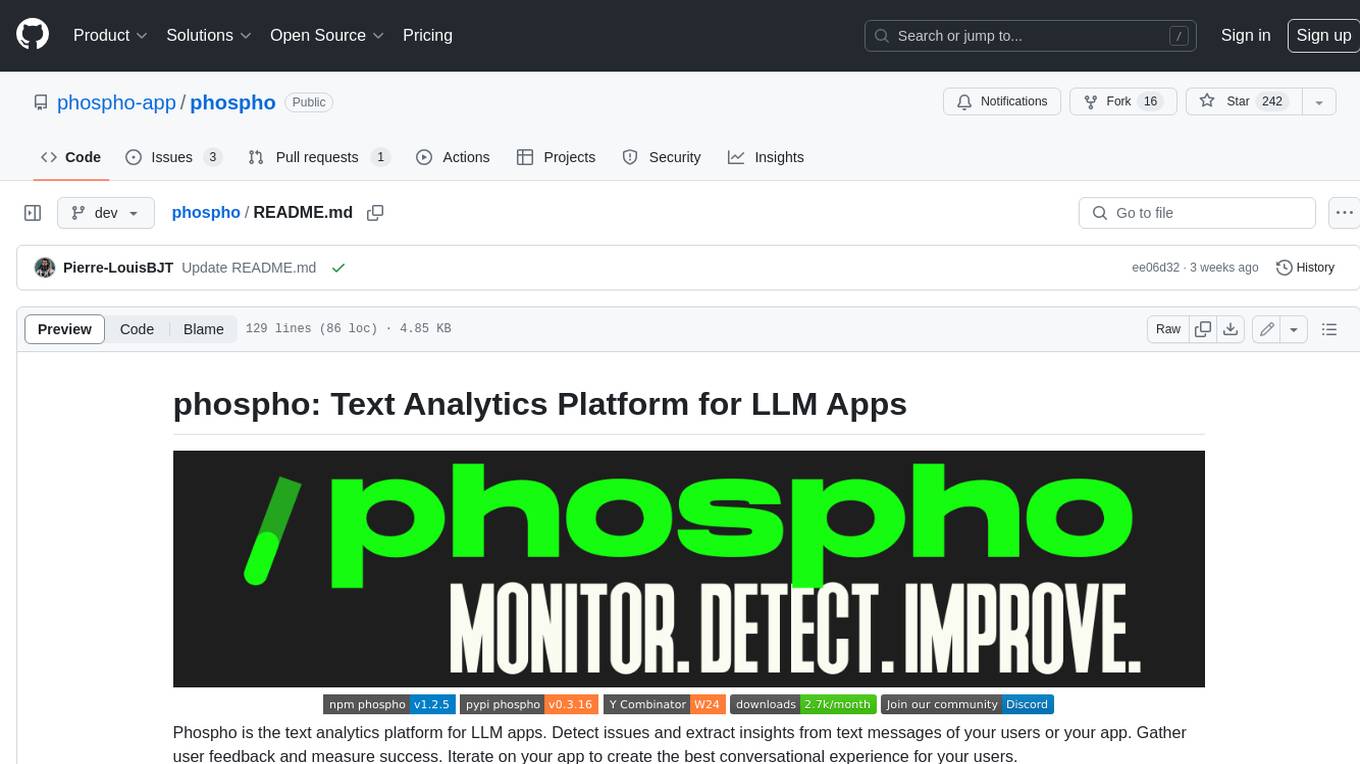
phospho
Phospho is a text analytics platform for LLM apps. It helps you detect issues and extract insights from text messages of your users or your app. You can gather user feedback, measure success, and iterate on your app to create the best conversational experience for your users.
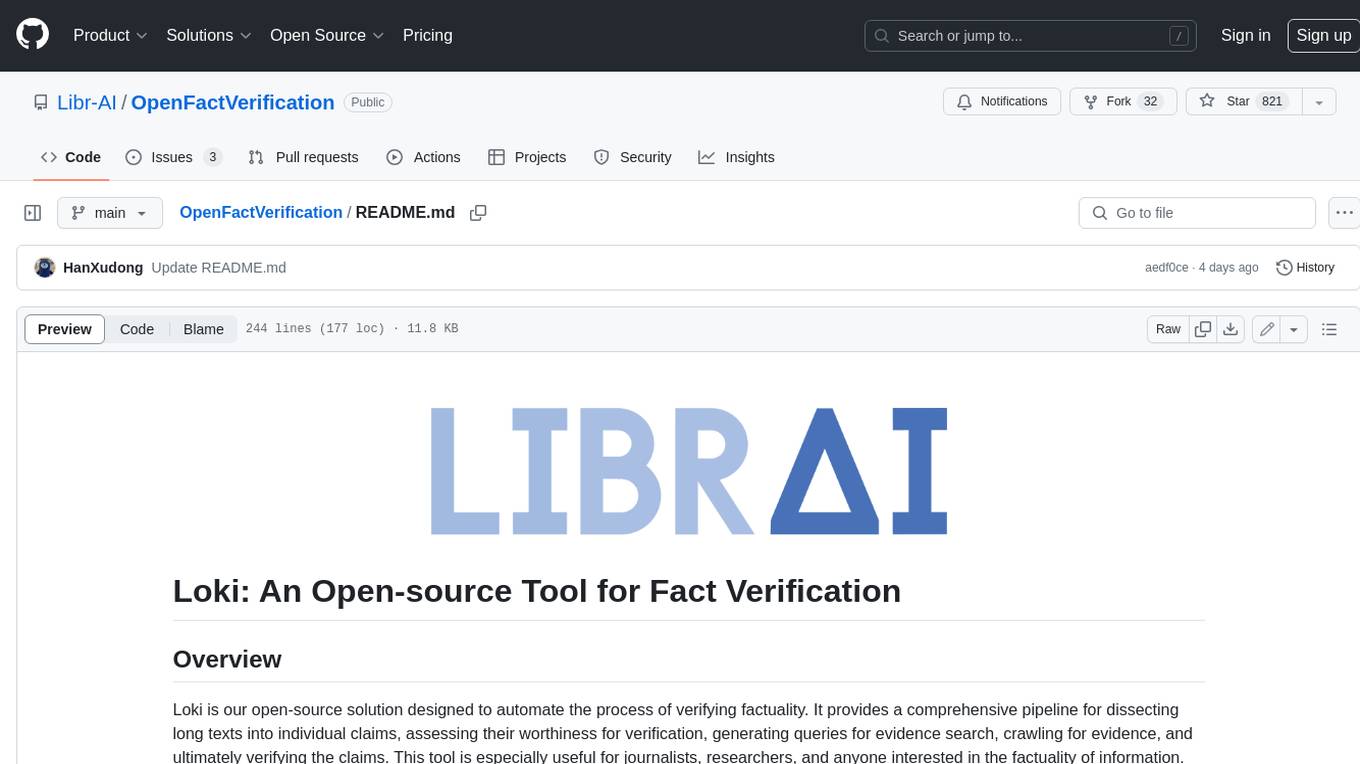
OpenFactVerification
Loki is an open-source tool designed to automate the process of verifying the factuality of information. It provides a comprehensive pipeline for dissecting long texts into individual claims, assessing their worthiness for verification, generating queries for evidence search, crawling for evidence, and ultimately verifying the claims. This tool is especially useful for journalists, researchers, and anyone interested in the factuality of information.

open-parse
Open Parse is a Python library for visually discerning document layouts and chunking them effectively. It is designed to fill the gap in open-source libraries for handling complex documents. Unlike text splitting, which converts a file to raw text and slices it up, Open Parse visually analyzes documents for superior LLM input. It also supports basic markdown for parsing headings, bold, and italics, and has high-precision table support, extracting tables into clean Markdown formats with accuracy that surpasses traditional tools. Open Parse is extensible, allowing users to easily implement their own post-processing steps. It is also intuitive, with great editor support and completion everywhere, making it easy to use and learn.
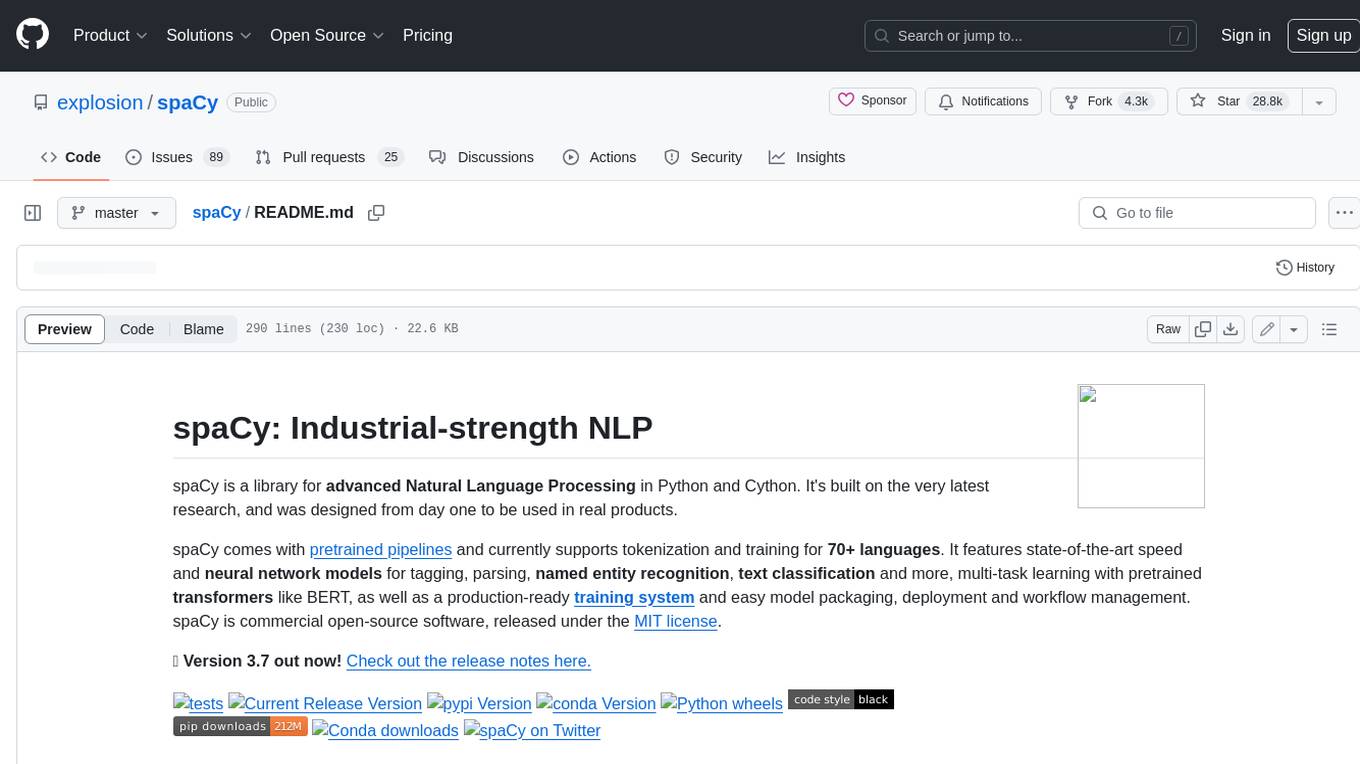
spaCy
spaCy is an industrial-strength Natural Language Processing (NLP) library in Python and Cython. It incorporates the latest research and is designed for real-world applications. The library offers pretrained pipelines supporting 70+ languages, with advanced neural network models for tasks such as tagging, parsing, named entity recognition, and text classification. It also facilitates multi-task learning with pretrained transformers like BERT, along with a production-ready training system and streamlined model packaging, deployment, and workflow management. spaCy is commercial open-source software released under the MIT license.

NanoLLM
NanoLLM is a tool designed for optimized local inference for Large Language Models (LLMs) using HuggingFace-like APIs. It supports quantization, vision/language models, multimodal agents, speech, vector DB, and RAG. The tool aims to provide efficient and effective processing for LLMs on local devices, enhancing performance and usability for various AI applications.

ontogpt
OntoGPT is a Python package for extracting structured information from text using large language models, instruction prompts, and ontology-based grounding. It provides a command line interface and a minimal web app for easy usage. The tool has been evaluated on test data and is used in related projects like TALISMAN for gene set analysis. OntoGPT enables users to extract information from text by specifying relevant terms and provides the extracted objects as output.
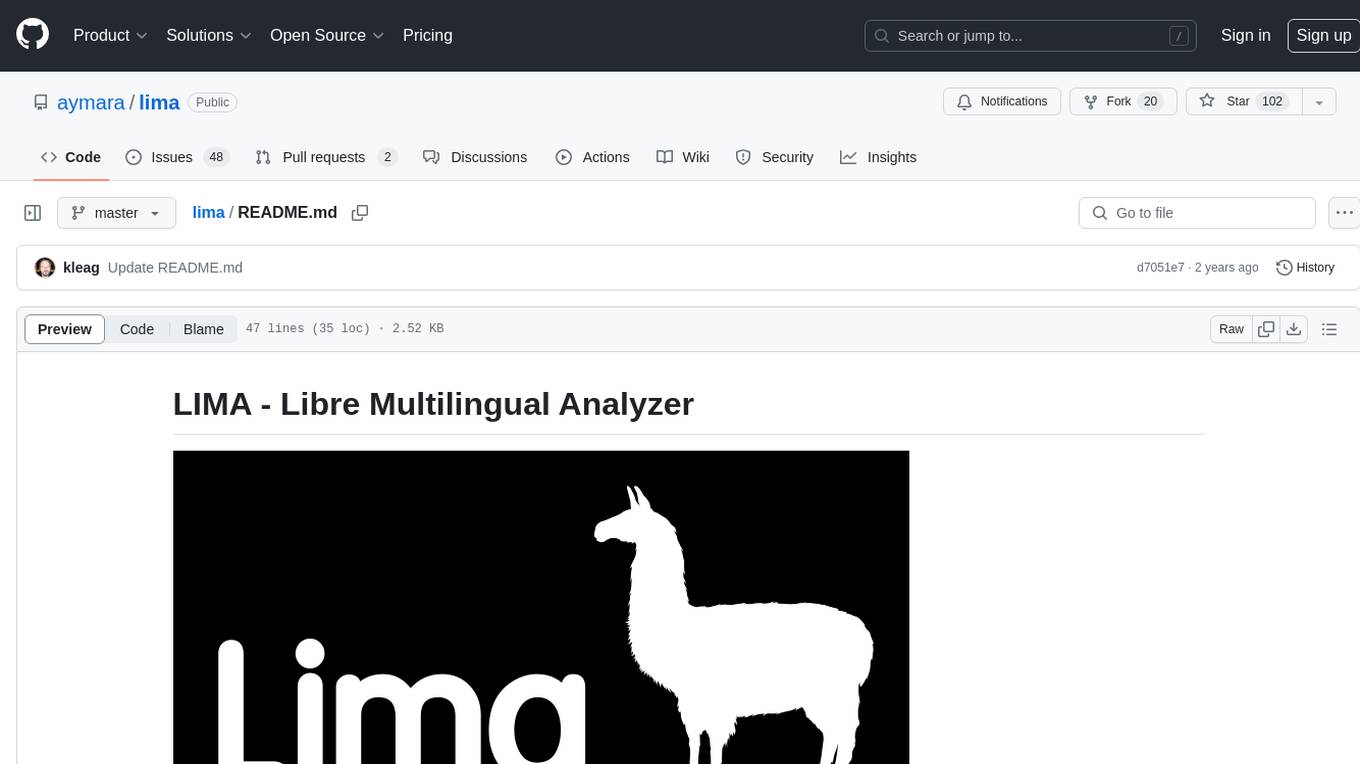
lima
LIMA is a multilingual linguistic analyzer developed by the CEA LIST, LASTI laboratory. It is Free Software available under the MIT license. LIMA has state-of-the-art performance for more than 60 languages using deep learning modules. It also includes a powerful rules-based mechanism called ModEx for extracting information in new domains without annotated data.
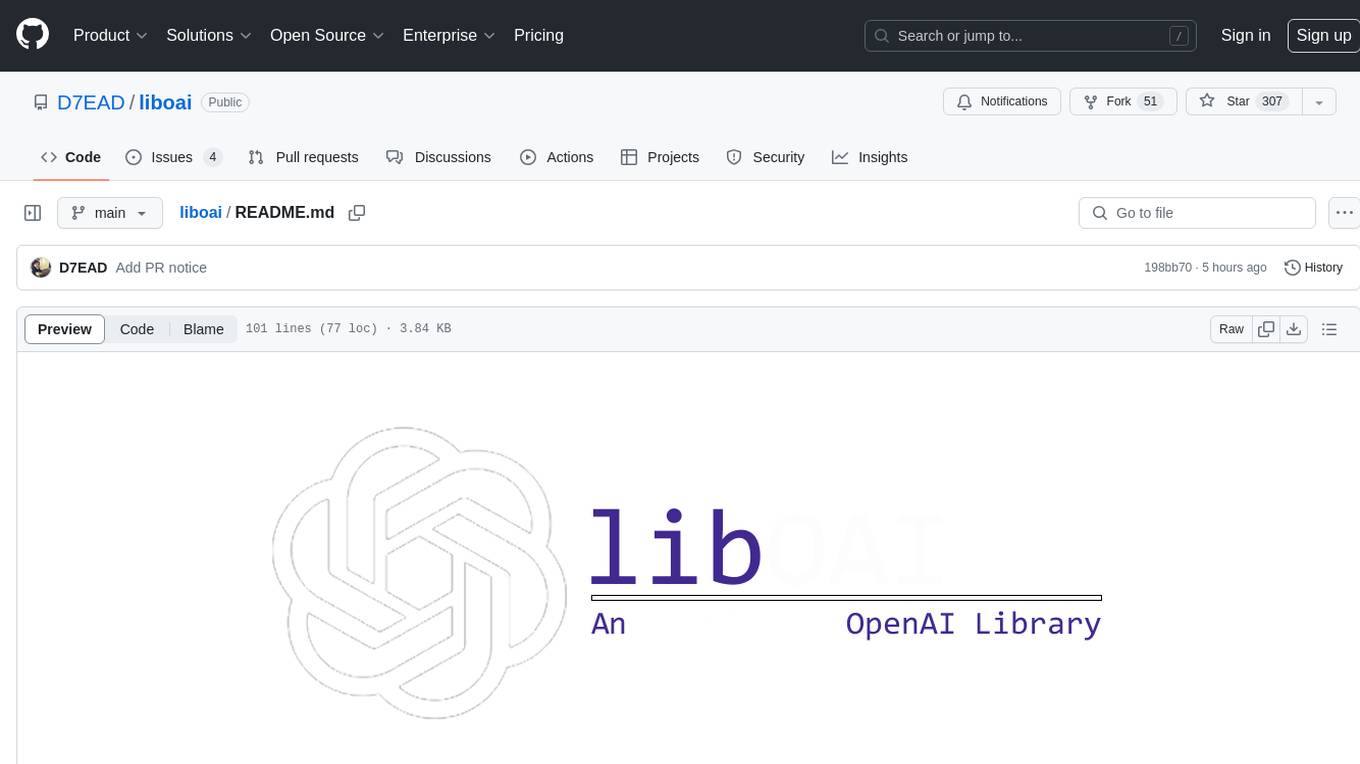
liboai
liboai is a simple C++17 library for the OpenAI API, providing developers with access to OpenAI endpoints through a collection of methods and classes. It serves as a spiritual port of OpenAI's Python library, 'openai', with similar structure and features. The library supports various functionalities such as ChatGPT, Audio, Azure, Functions, Image DALL·E, Models, Completions, Edit, Embeddings, Files, Fine-tunes, Moderation, and Asynchronous Support. Users can easily integrate the library into their C++ projects to interact with OpenAI services.
For similar jobs

weave
Weave is a toolkit for developing Generative AI applications, built by Weights & Biases. With Weave, you can log and debug language model inputs, outputs, and traces; build rigorous, apples-to-apples evaluations for language model use cases; and organize all the information generated across the LLM workflow, from experimentation to evaluations to production. Weave aims to bring rigor, best-practices, and composability to the inherently experimental process of developing Generative AI software, without introducing cognitive overhead.

LLMStack
LLMStack is a no-code platform for building generative AI agents, workflows, and chatbots. It allows users to connect their own data, internal tools, and GPT-powered models without any coding experience. LLMStack can be deployed to the cloud or on-premise and can be accessed via HTTP API or triggered from Slack or Discord.

VisionCraft
The VisionCraft API is a free API for using over 100 different AI models. From images to sound.

kaito
Kaito is an operator that automates the AI/ML inference model deployment in a Kubernetes cluster. It manages large model files using container images, avoids tuning deployment parameters to fit GPU hardware by providing preset configurations, auto-provisions GPU nodes based on model requirements, and hosts large model images in the public Microsoft Container Registry (MCR) if the license allows. Using Kaito, the workflow of onboarding large AI inference models in Kubernetes is largely simplified.

PyRIT
PyRIT is an open access automation framework designed to empower security professionals and ML engineers to red team foundation models and their applications. It automates AI Red Teaming tasks to allow operators to focus on more complicated and time-consuming tasks and can also identify security harms such as misuse (e.g., malware generation, jailbreaking), and privacy harms (e.g., identity theft). The goal is to allow researchers to have a baseline of how well their model and entire inference pipeline is doing against different harm categories and to be able to compare that baseline to future iterations of their model. This allows them to have empirical data on how well their model is doing today, and detect any degradation of performance based on future improvements.

tabby
Tabby is a self-hosted AI coding assistant, offering an open-source and on-premises alternative to GitHub Copilot. It boasts several key features: * Self-contained, with no need for a DBMS or cloud service. * OpenAPI interface, easy to integrate with existing infrastructure (e.g Cloud IDE). * Supports consumer-grade GPUs.

spear
SPEAR (Simulator for Photorealistic Embodied AI Research) is a powerful tool for training embodied agents. It features 300 unique virtual indoor environments with 2,566 unique rooms and 17,234 unique objects that can be manipulated individually. Each environment is designed by a professional artist and features detailed geometry, photorealistic materials, and a unique floor plan and object layout. SPEAR is implemented as Unreal Engine assets and provides an OpenAI Gym interface for interacting with the environments via Python.

Magick
Magick is a groundbreaking visual AIDE (Artificial Intelligence Development Environment) for no-code data pipelines and multimodal agents. Magick can connect to other services and comes with nodes and templates well-suited for intelligent agents, chatbots, complex reasoning systems and realistic characters.
